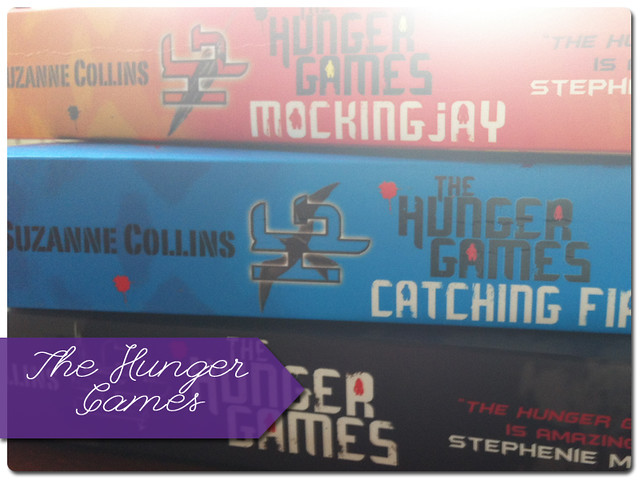
I have witheld this review for many months, I finished the first in The Hunger Games series in December of 2011, but I have only just read the two sequels, and decided writing about them all at once would be best.
Obviously there are reviews of this series everywhere since the release of the film, and many many people have read them, seen the film, and are absolutely mad about them. It's Twilight all over again right? Wrong.
I too had initially been very sceptical about reading these, just as I was about reading the vampire novels, and prepared myself for a fun little read where I didn't have to think too much, but I have been pleasantly surprised. The Hunger Games is not simply a dystopian adventure where a kick ass girl gets to save her sister and gets to kiss a pretty boy, but a political lesson about the way we live now and what we could devolve to.
Occasionally I feel like directing the teens who are mad on this series to George Orwell or Aldous Huxley, but The Hunger Games really isn't so bad and it is teaching them a lesson in appreciating what they have, a lesson teens of today appear to be in dire need of.
Like most teen reads nowadays, the first novel is fast paced, we meet Katniss Everdeen, a sixteen year old girl who lives in District 12 of the city of Panem, a city where the Capitol leeches from the produce of the districts and lives in the lap of luxury while the twelve districts only just survive. We know right from the start that Katniss is a rule breaker, she will be our heroine, she steps in to save her younger sister when she is chosen to participate in the hunger games, a competition the Capitol holds for entertainment and to punish the districts for uprising in the distant past, by which each district is forced to sacrifice one boy and one girl to enter an arena and fight to the death where only one child will survive. Katniss is revealed as being quick, smart, but also fast to anger and terribly bitter about the life she is forced to lead.
The main body of the first novel features Katniss' selection at 'The Reaping' and then her preparation for the games themselves, followed by the actual games. The preparation for the games is a part of the novel I did not think I would find interesting, but Collins has turned it into a a venturing into the big wide world sort of situation with Katniss having to grow up fast as she realises she needs to manipulate her situation if she wishes to survive. The games themselves were interesting and kept me gripped, I do not believe I put down the book once while reading about the actual games.
After finishing the first book, which occurs directly after the games have ended, I was not sure I would be much interested in the second and third novels, mainly because it was not entirely clear where they were going to go. The dystopian elements of the series were blatantly obvious, but wether they were going to delve into these political issues was not clear and so I held off reading the sequels, I didn't feel the same rush to pick them up as I had to continue reading the first.
When I did however pick them up and start reading I found them interesting. The political discussion in the following two books makes up the main body of the plots, the result of the first novel has caused ramifications beyond Katniss' imaginings and she has to either fix them or join the apparent forthcoming uprising.
The second novel, Catching Fire, in particular had me going from crying to laughing within seconds, and the development of Katniss and Peeta's relationship truly interested me as it showed some real development to the characters, Katniss who had previously been quite cold and hard on the surface at times allowed more of her emotions to crack through. There is an actual games in this second novel, which I was not expecting, and it was a great twist, a fabulous choice by the author and surprised me.
I would say that the third novel, Mockingjay, is the most political, as at this point Panem is in the midst of a second uprising. I would say that in terms of story this was the weakest of the three novels, I was not gripped as I had been, and I felt the character developed less, but the lessons it could teach to young adults are important. Katniss realises that she is not the most important person in her world, that she is merely a figurehead and is being used somewhat, her attempts to change this situation often place others in grave danger, but ultimately she has some power to change her fate.
Overall I would say that the series is a great way of leading young adults into dystopian literature, and it has sparked many stories in this vein. It has the potential to show that age group that their material goods are not the be all and end all, and should be highly commended for doing so.
★★★★


No comments :
Post a Comment
Note: only a member of this blog may post a comment.